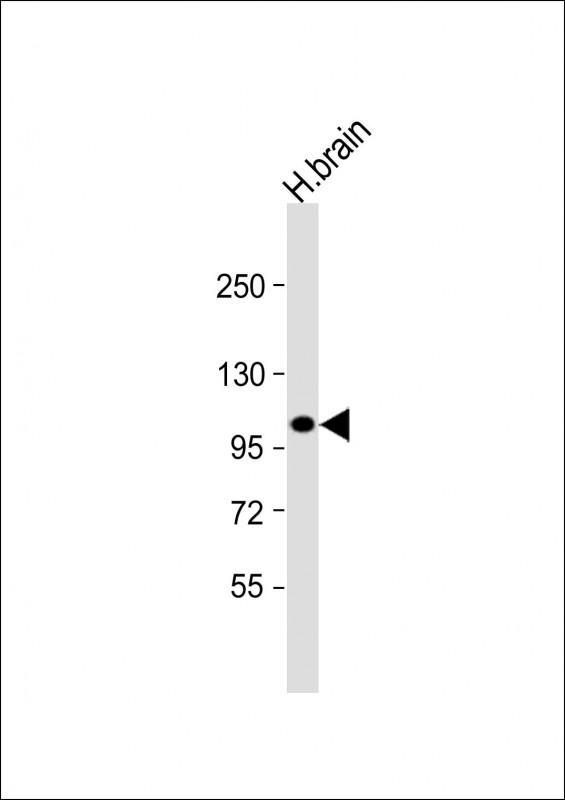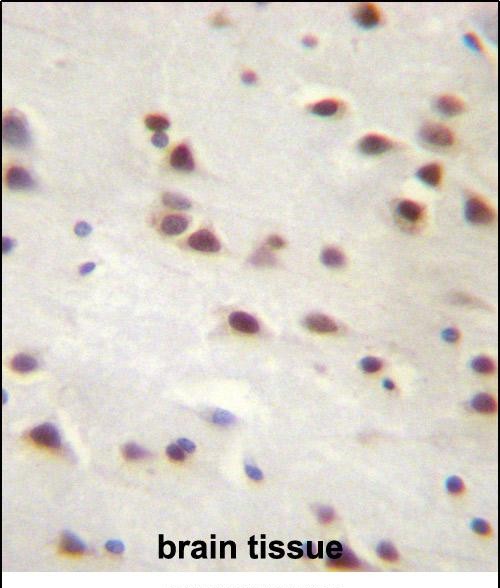

| WB | 1/1000 | Human,Mouse,Rat |
| IF | 咨询技术 | Human,Mouse,Rat |
| IHC | 1/100-1/500 | Human,Mouse,Rat |
| ICC | 技术咨询 | Human,Mouse,Rat |
| FCM | 咨询技术 | Human,Mouse,Rat |
| Elisa | 咨询技术 | Human,Mouse,Rat |
| Aliases | Ankyrin repeat domain-containing protein 6, Diversin, ANKRD6, KIAA0957 |
| Entrez GeneID | 22881 |
| WB Predicted band size | 80.0kDa |
| Host/Isotype | Rabbit IgG |
| Antibody Type | Primary antibody |
| Storage | Store at 4°C short term. Aliquot and store at -20°C long term. Avoid freeze/thaw cycles. |
| Species Reactivity | Human |
| Immunogen | This ANKRD6 antibody is generated from rabbits immunized with a KLH conjugated synthetic peptide between 314-343 amino acids from the Central region of human ANKRD6. |
| Formulation | Purified antibody in PBS with 0.05% sodium azide. |
+ +
以下是3篇涉及ANKRD6抗体的参考文献概览:
1. **"ANKRD6 is a novel functional regulator of β-catenin in the Wnt signaling pathway"**
- 作者:Zhang Y, et al.
- 摘要:该研究通过免疫共沉淀和Western blot技术,利用ANKRD6特异性抗体证实其作为β-catenin的负调控因子,通过促进β-catenin降解抑制Wnt信号通路,影响结直肠癌细胞增殖。
2. **"The ankyrin repeat protein ANKRD6 interacts with PLEKHA7 and regulates tight junction integrity in polarized epithelial cells"**
- 作者:Murakami MT, et al.
- 摘要:通过免疫荧光和免疫印迹(使用ANKRD6抗体),发现ANKRD6与PLEKHA7结合并调控上皮细胞紧密连接结构的稳定性,揭示其在细胞极性维持中的作用机制。
3. **"Expression profiling and functional analysis of ANKRD6 during neural crest development"**
- 作者:Li S, et al.
- 摘要:研究利用ANKRD6抗体进行组织染色和功能缺失实验,证明其在神经嵴细胞迁移中的关键作用,可能与Wnt/PCP(平面细胞极性)通路相关。
提示:若需具体实验细节(如抗体货号或应用场景),建议通过PubMed或抗体供应商(如Abcam、CST)的产品引用文献进一步查询。
The ANKRD6 (Ankyrin Repeat Domain 6) antibody is a tool used to detect and study the ANKRD6 protein, a member of the ankyrin repeat-containing protein family. ANKRD6 is implicated in regulating Wnt/β-catenin signaling, a critical pathway for embryonic development, cell proliferation, and tissue homeostasis. It interacts with dishevelled (DVL) proteins, modulating Wnt signal transduction and influencing processes like planar cell polarity and stem cell differentiation. Dysregulation of ANKRD6 has been linked to developmental disorders and cancers, including colorectal and breast cancer, though its precise mechanisms remain under investigation.
ANKRD6 antibodies are essential for visualizing protein expression, localization, and interactions in experimental models. They are widely used in techniques such as Western blotting, immunohistochemistry (IHC), and immunofluorescence (IF) to explore ANKRD6's role in health and disease. Commercially available antibodies vary in clonality (monoclonal/polyoclonal), species reactivity (human, mouse, rat), and application-specific validation. Researchers rely on these antibodies to uncover ANKRD6's functional dynamics, particularly its crosstalk with signaling pathways and potential as a therapeutic target. Proper validation of antibody specificity via knockout controls or siRNA is crucial to ensure reliability in experimental outcomes.
×